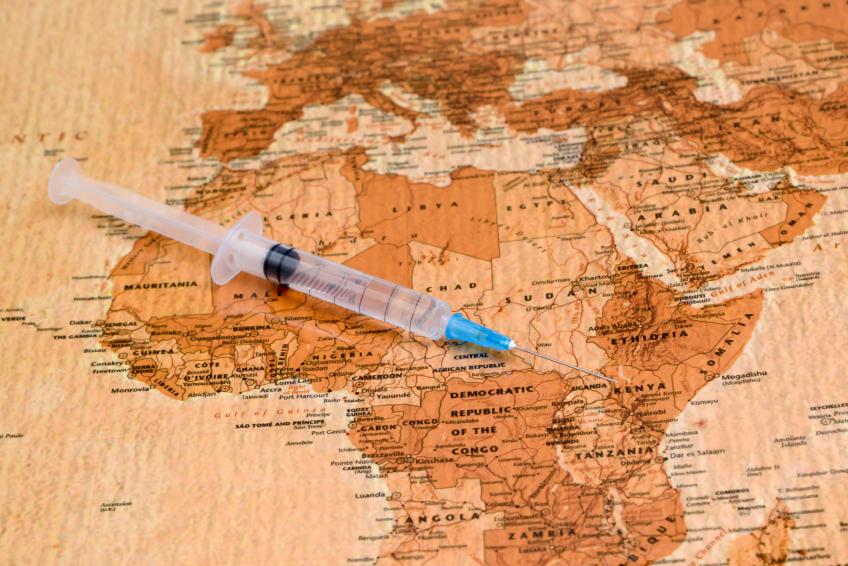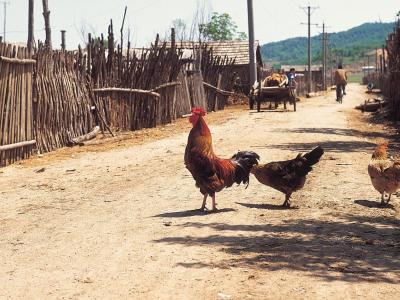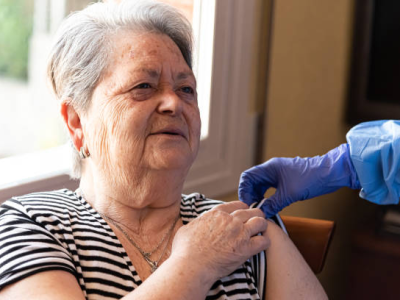The first African trial of vaccines against Ebola and Marburg viruses showed a modest immune response and promising safety results, and the authors say the findings have already proved useful in developing a more potent version of the Ebola vaccine, now in its first human trials.
The DNA vaccines against the two filoviruses were developed by the US National Institute of Allergy and Infectious Diseases (NIAID), and the African trial began in 2009 in Uganda, well before West Africa's current Ebola outbreak. Researchers from the NIAID's Vaccine Research Center and their Ugandan colleagues published their findings yesterday in The Lancet.
Since the Uganda trials began and in the wake of West Africa's Ebola outbreak, researchers, including a team from GSK, have developed a more potent version of the vaccine, called ChAd3, which uses a modified chimpanzee adenovirus. The first human trials of the more potent vaccine launched in September, with other trials now under way in the United Kingdom, Mali, and Uganda.
Julie Ledgerwood, DO, lead author of the study and chief of the clinical trials program at the NIAID Vaccine Research Center, said in a statement from the journal that the study is the first to show an immune response to an Ebola vaccine in an African population comparable to that shown in US volunteers a few weeks ago with the more potent vaccine.
"This is particularly encouraging because those at greatest risk of Ebola live primarily in Africa, and diminished vaccine protection in African populations has been seen for other diseases," she said.
Uganda trial findings
The vaccine for Ebola codes for proteins from the Zaire and Sudan strains. The Zaire strain is responsible for West Africa's outbreak. Immune responses against the Ebola and Marburg virus proteins have been linked with good protection in nonhuman primate trials.
Researchers from the Makerere University Walter Reed Program conducted the phase 1 human trial in Kampala, enrolling 108 healthy adults aged 18 to 50 years from November 2009 to April 2010. Participants randomly received the Ebola vaccine (30), the Marburg vaccine (30), both vaccines (30), or placebo (18). They received three 4-milligram doses at 4-week intervals.
When administered separately or together, the vaccines were safe and provoked an immune response in the form of neutralizing bodies and T-cells against the virus proteins. Four weeks after the third injection, the team found that 57% (17 of 30) of volunteers in the Ebola vaccine group showed an antibody response to the Ebola Zaire protein, and they saw an antibody response in 14 of 30 (47%) people who received both vaccines.
However, the response didn't last long, dropping off to undetectable levels after 11 months.
A safety analysis showed both vaccines were well tolerated, with similar numbers of local and systemic reactions in all three groups. The team saw only one serious adverse event, neutropenia, in a Marburg virus subject, but they didn't think it was related to the vaccine.
Ledgerwood said the findings have already been used in developing the more potent vaccine.
Results for stronger version of vaccine
Initial findings from the first human trial of the more potent vaccine, a bivalent one that includes genetic material from the Zaire and Sudan Ebola species, were published at the end of November. That small study, conducted at the National Institutes of Health (NIH) Clinical Center in Bethesda, Md., assessed two different dose levels, and antibody levels were higher in the group that received the higher dose. Investigators found no adverse events, other than brief fevers in two of the higher-dose recipients.
Phase 1 studies are also under way for a Canadian-developed Ebola vaccine that uses an Ebola virus protein spliced into a vesicular stomatitis virus (VSV-EBOV). Though trial findings have not been published, earlier this month researchers said no serious adverse reactions had been seen, but a few days later Swiss researchers temporarily paused the study to explore mild joint pain in some of the participants. Health experts said they didn't think the issue would delay the trial.
Research studies have suggested that the Canadian vaccine would require only one dose, compared with two doses that may be needed for the NIH-GSK vaccine.
Key questions about vaccine remain
In a commentary on the Uganda trial findings that appears in the same Lancet issue, Saranya Sridhar, MBBS, DPhil, with the Jenner Institute at the University of Oxford in the United Kingdom, wrote that West Africa's Ebola epidemic is a sobering reminder of the devastating effects of filovirus outbreaks.
He said a crucial question, as with other vaccines, is whether they are as safe and immunogenic when used in Africa as elsewhere. The Ugandan trial sheds some light on the issue, he said, yielding results similar to those of an American trial of the same vaccines and providing a glimpse of what might be expected from ongoing trials of virus-vectored Ebola vaccines in Africa.
However, Sridhar urged cautious interpretation of the results, given the small number of people in the Ugandan trial and results from tuberculosis vaccine trials that showed lower vaccine immunogenicity in African populations. He also said the low proportion of Ugandan participants who showed an immune response to the Ebola vaccine alone or combined with the Marburg virus vaccine raises the question of whether a low response to the ChAd3would affect vaccination strategies for use in West Africa's outbreak. "Will it be necessary to give higher doses, multiple doses, or a modified vaccinia Ankara booster?" he wrote.
Sridhar said that in light of the Ebola epidemic, researchers and policymakers should ask themselves if a filovirus vaccine should have been further along in development. He added that the response shows how quickly vaccine developments can progress: "This study is the first step on the aspirational road towards the deployment of filovirus vaccines in Africa and must serve to shake the metaphorical cobwebs that can stall our advance towards this destination."
Other developments
- The global Ebola total has grown to 19,431 cases, 7,565 of them fatal, the World Health Organization (WHO) said today in a brief update. With 9,004 cases, Sierra Leone has the highest number among the three hardest hit nations, though Liberia has the highest death toll, which is at 3,376. The case totals for Sierra Leone and Guinea are as of Dec 21, and Liberia's numbers are as of Dec 18.
- The United Nations Mission for Ebola Emergency Response (UNMEER) said today that Sierra Leone is withdrawing its troops from Somalia after the African Union blocked Sierra Leone from rotating its troops over Ebola fears. Sierra Leone deployed 850 troops to Somalia in 2013 to help battle a jihadist terror group, and a rotation group of 800 was quarantined after one soldier tested positive for Ebola. In August Somalia's president, pressured by activists, asked that no new troops be deployed from Sierra Leone. Elsewhere, response teams are responding to fresh cases in several villages in Guinea's Kissidougou district, and a Rapid Isolation and Treatment of Ebola (RITE) team arrived in the Liberian city of Yekepa to investigate reports that a 12-year-old girl with Ebola crossed the border from Guinea into Liberia's Nimba county.
- NewLink Genetics and Merck announced yesterday that the Biomedical Advanced Research and Development Authority (BARDA), part of the US Department of Health and Human Services (HHS), has awarded a $30 million contract to NewLink subsidiary BioProtection Systems to support the manufacturing and development of the VSV-EBOV Ebola vaccine. The award covers clinical development through a new 330-person phase 1b study. The vaccine was developed by the Public Health Agency of Canada and has been licensed to NewLink and Merck.
- Fear reactions can worsen the spread of disease in outbreaks, and more efforts are needed to address the psychological needs of people impacted by the Ebola outbreak in West Africa, experts from the University of Miami, Columbia University, and Uganda wrote yesterday in a commentary in the Journal of the American Medical Association (JAMA). They said the Ebola response roadmap has few recommendations to address fear-driven behavior, such as evading authorities and seeking traditional healers, and doesn't adequately address the mental health needs of communities that grapple with the virus. They wrote that Liberia and Sierra Leone each have only one practicing psychiatrist, only several dozen mental health nurses, and about 100 trained paraprofessionals who can handle mental health issues. International aid groups are starting to prioritize psychological support. Key features of a proactive response should include rapid assessment of stressors for citizens and health workers, they wrote, adding that trauma signature analysis is an evidence-based tool for gauging exposure and could be used to help target interventions.
See also:
Dec 22 Lancet report
Dec 22 Lancet press release
Nov 26 CIDRAP News story "First human trial of NIH-GSK Ebola vaccine shows promise"
Dec 22 Lancet commentary
Dec 23 WHO Ebola situation summary
Dec 23 UNMEER update
Dec 22 NewLink Genetics press release
Dec 22 JAMA commentary

















